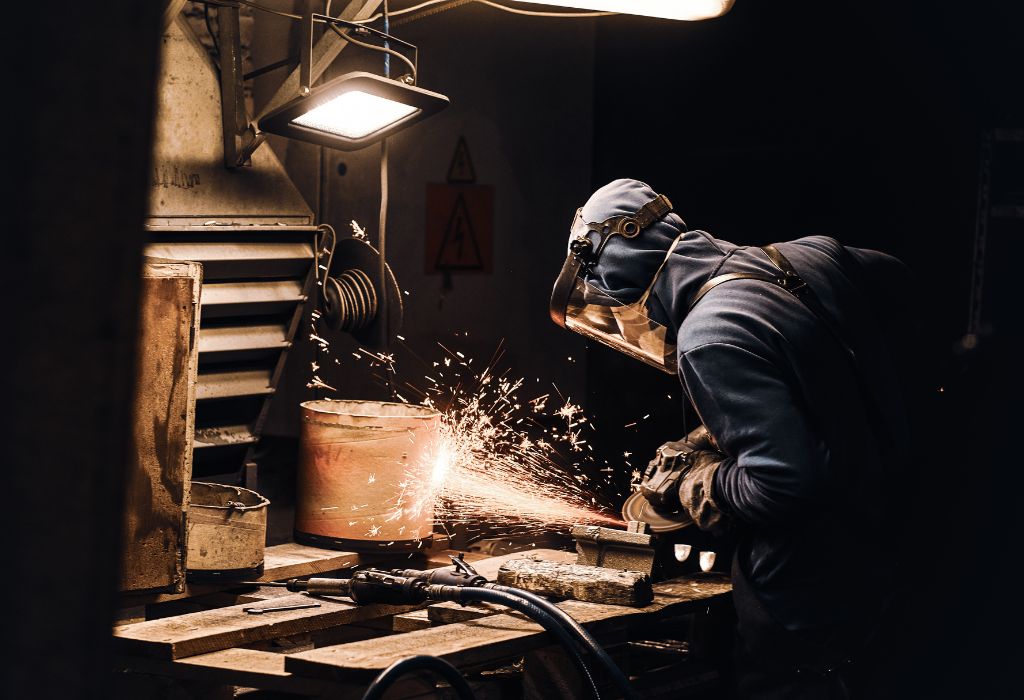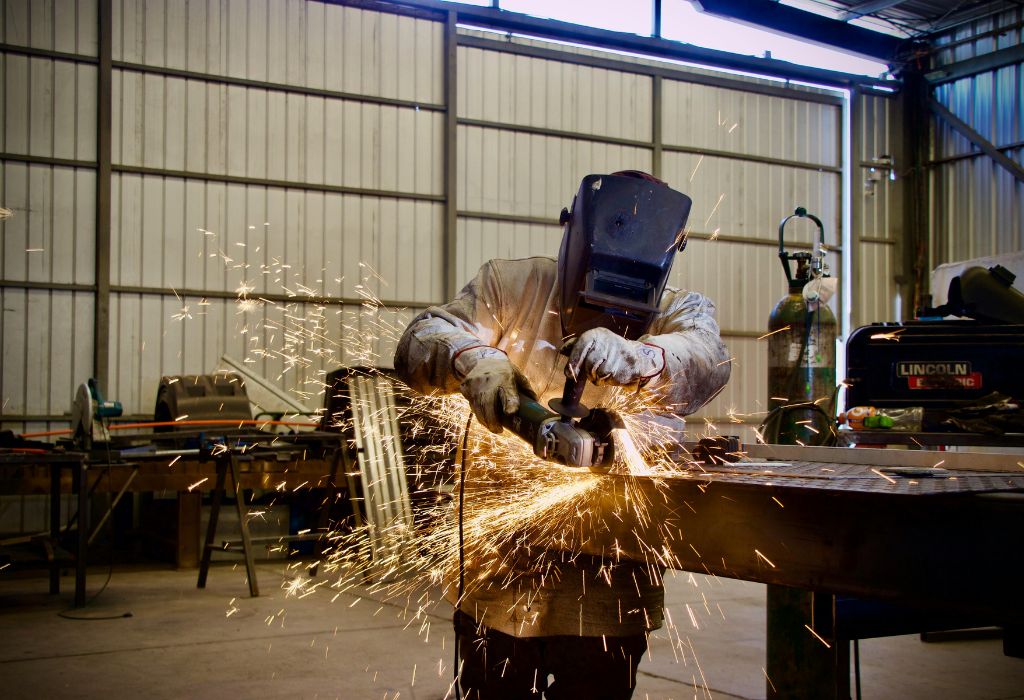A construction site grinds to a halt when a steel beam connection fails, and the nearest fabrication shop is hours away.
In such moments, a mobile welder arrives on-site with the tools, expertise, and independence to solve the problem immediately.
Mobile welding has become one of the most in-demand career paths in the skilled trades. It offers flexibility, the ability to set independent rates, and the chance to serve industries ranging from agriculture and construction to marine and oil and gas.
The demand for welding skills continues to rise worldwide. In the United States alone, the Bureau of Labor Statistics projects more than 42,000 job openings for welders each year through 2032 (BLS).
This shortage creates opportunities for those who are willing to work in mobile settings where repairs and fabrication cannot wait.
The appeal is not just about job security but also earning potential. Mobile welders often charge higher rates than shop-based welders because they provide emergency service, travel to remote sites, and offer specialized certifications. Some professionals even earn six-figure incomes by combining technical skill with strong business planning.
Curiosity often begins with simple questions: how do you learn the trade, what equipment is required, and what legal steps are necessary to operate independently?
The path involves a combination of skill training, certifications, investment in a rig, and building a reliable client base.
This guide provides a step-by-step explanation of how to become a mobile welder. It covers the essential skills, education options, startup costs, pricing strategies, and future trends that can help new welders succeed in this growing field.
What a Mobile Welder Actually Does

A mobile welder is a skilled professional who brings welding services directly to clients instead of working from a fixed shop. This flexibility allows them to handle urgent repairs, on-site fabrication, and structural fixes where equipment cannot be moved.
The work ranges from repairing farm machinery and heavy equipment to fabricating railings, gates, and construction components. Mobile welders are often called for emergency jobs where downtime costs companies thousands of dollars per hour.
Unlike shop welders, mobile welders must be prepared for unpredictable conditions. They work outdoors in variable weather, handle different materials, and carry equipment that can power itself in remote locations.
The scope of work is broad, which makes the role both challenging and rewarding. Strong problem-solving skills and the ability to adapt quickly are just as important as technical welding expertise.
What is a mobile welder?
A tradesperson who performs welding and fabrication work at job sites rather than in a stationary shop.
What industries hire mobile welders?
Construction, agriculture, marine, oil and gas, manufacturing, and heavy equipment repair.
What metals are most commonly welded in the field?
Carbon steel, stainless steel, aluminum, and occasionally cast iron.
Is mobile welding usually full-time or part-time?
It can be either, with many welders starting part-time before scaling into a full-time business.
Do mobile welders need a truck or trailer?
Yes, most rely on a welding rig mounted on a truck or trailer that carries the welder, generator, gas, and tools.
Core Skills You Must Master to Become a Mobile Welder
Success in mobile welding depends on more than basic welding ability. A professional must master multiple processes, materials, and safety procedures to handle diverse field jobs.
Stick welding (SMAW) remains the backbone of mobile work due to its ability to weld outdoors on dirty or rusty materials. MIG (GMAW), TIG (GTAW), and flux-core (FCAW) provide versatility for different metals and precision requirements.
Cutting and preparation skills are equally vital. Mobile welders use oxy-fuel torches and plasma cutters to remove damaged sections, shape materials, and prepare joints for repair.
Beyond technique, problem-solving and adaptability matter. Field jobs often involve unusual positions, tight spaces, or weather conditions that demand creative solutions.
Which welding process is most versatile in the field?
Stick welding is most reliable for outdoor and dirty conditions.
Is TIG welding essential for mobile welders?
Yes, for stainless and aluminum jobs requiring precision.
How important is cutting and prep work?
Critical—good prep reduces defects and ensures strong welds.
Do mobile welders need blueprint skills?
Yes, they must read prints and weld symbols to complete structural jobs.
What is the fastest way to improve quality?
Practice multi-position welds on different materials regularly.
Education Paths: School, Apprenticeship, or Self-Directed
There are several routes to becoming a skilled mobile welder. Trade schools and community colleges offer structured programs that teach fundamentals and prepare students for certification tests.
Apprenticeships combine paid work with mentorship, giving learners real-world experience alongside journeyman welders. These programs often last several years but build strong foundations.
Self-directed learning is possible for motivated individuals. Many welders teach themselves, then test for certifications once they reach skill benchmarks. However, this path requires discipline and practice facilities.
Is a degree required to become a mobile welder?
No, formal education helps but is not mandatory.
How long is trade school training?
Most programs last 6 to 18 months.
Are apprenticeships paid?
Yes, they provide wages that increase with experience.
Can you self-learn welding and still certify?
Yes, if you can pass AWS or ASME performance tests.
What should a good training program include?
Multi-process practice, safety, codes, and blueprint reading.
Certifications & Codes That Win Jobs
Certifications prove skill and unlock higher-paying work. The AWS D1.1 Structural Steel certification is one of the most valuable for mobile welders.
Other relevant certifications include D1.3 for sheet steel, D1.6 for stainless, and API 1104 for pipelines. ASME Section IX performance qualifications are critical for pressure vessel and piping jobs.
Maintaining continuity records and renewing certifications keeps welders job-ready. Many clients require proof of certs before awarding contracts.
Which certification should come first?
AWS D1.1 3G/4G structural steel.
Do clients verify certifications?
Yes, paperwork must be ready for inspection.
Are pipeline certifications necessary?
Only for oil, gas, and pipeline projects.
How often should certifications be renewed?
Follow code requirements, usually every 6 months with continuity logs.
Do certifications guarantee jobs?
No, but they expand opportunities and credibility.
Your Mobile Welding Rig: Tools, Truck & Budget

A reliable rig is the backbone of a mobile welding career. Most welders use a ¾-ton truck with a bed or trailer to carry a welder/generator, leads, bottles, and tools.
An engine-driven welder is standard for field use, providing independent power. Some welders invest in inverter machines for portability, but engine drives remain the industry standard.
Other essentials include grinders, clamps, PPE, gas cylinders, torches, and consumables. Organization and storage are crucial for efficiency on the road.
Can you start with a half-ton truck?
Yes, for light work, but payload is limited.
Do you need an engine-driven welder?
Yes, it provides reliable power in remote areas.
What about using a trailer rig?
A good option if you want flexibility without upgrading trucks.
How much does a basic rig cost?
Between $8,000 and $20,000 depending on equipment.
Which PPE is mandatory?
Auto-dark helmet, FR clothing, gloves, boots, and safety glasses.
Legal, Insurance & Compliance Setup
Running a mobile welding business requires proper legal and insurance coverage. Setting up as an LLC separates personal and business liability.
Insurance is essential. General liability, commercial auto, and professional liability protect welders from accidents and claims.
Compliance includes permits for hot work, OSHA standards, and proper recordkeeping of certifications and safety training.
Do you need an LLC to start?
Not mandatory, but strongly recommended.
What insurance is required?
General liability and commercial auto are minimum.
Are hot-work permits always required?
Yes, on most job sites following NFPA 51B.
Do DOT rules apply to mobile welders?
Yes, if truck and trailer weight exceeds thresholds.
How do you track compliance?
Keep digital copies of certs, permits, and safety logs.
Pricing, Quotes & Income Models for Mobile Welders
Pricing strategies vary. Many mobile welders charge by the hour, while others use flat bids for predictable jobs.
Travel fees, emergency surcharges, and material markups are common. Income potential depends on efficiency, reputation, and ability to handle specialized jobs.
What is a typical hourly rate?
Rates range from $75 to $150 depending on location.
Should you charge a call-out fee?
Yes, to cover travel and setup time.
How to quote unpredictable jobs?
Use time-and-material contracts with caps.
When to require deposits?
For material purchases or long projects.
How to handle change orders?
Document and approve them before continuing.
Finding Clients & Niches That Pay Fast
Marketing is vital for mobile welders. Setting up a Google Business Profile and posting before-and-after photos builds credibility.
High-paying niches include heavy equipment repair, agricultural machinery, construction site welding, and marine fabrication. Emergency 24/7 services also command premium rates.
What’s the fastest way to land first jobs?
Local advertising and networking with contractors.
Which niches pay the most?
Heavy equipment and construction repairs.
Do you need a website?
Yes, even a simple one boosts credibility.
How do you get repeat clients?
Offer maintenance contracts and consistent service.
What photos help most in marketing?
Clear welds, safety practices, and field setups.
Safety in the Field: Non-Negotiables
Field welding introduces unique hazards. Fire prevention, ventilation, and PPE are non-negotiable.
Proper handling of gas cylinders, electrical grounding, and hot-work permits reduce risks. Safety practices protect welders and reassure clients.
What is the biggest hazard in mobile welding?
Fire and fumes.
Are respirators necessary?
Yes, especially for stainless and galvanized metals.
How do you protect the public on-site?
Barriers, signs, and blankets.
Who signs hot-work permits?
Site representatives.
How do you document safety?
Daily checklists and photos.
Common Mistakes New Mobile Welders Make

Many beginners underprice jobs, skip insurance, or ignore paperwork. These mistakes can lead to lost money and liability issues.
Lack of preparation, poor equipment maintenance, and taking every job without considering profitability are also common.
Why do bids lose money?
Not accounting for travel and consumables.
Is being cheap bad for business?
Yes, it attracts low-value clients.
What kills repeat business?
Missed deadlines and poor communication.
How to avoid scope creep?
Use written contracts and change orders.
When should you decline work?
Unsafe or unprofitable jobs.
Future Trends: Tech & Opportunities in Mobile Welding
Technology is reshaping mobile welding. Battery-powered welders, inverter machines, and digital WPS apps are becoming more common.
Specialized markets like stainless and aluminum welding in food, marine, and energy sectors are growing.
Will robots replace mobile welders?
No, irregular field work requires humans.
Are battery welders practical now?
Yes, for small jobs, though engine drives still dominate.
Are digital certifications useful?
Yes, they provide instant proof to clients.
Which markets are growing fastest?
Marine, EV infrastructure, and stainless fabrication.
How can welders stay competitive?
Continuous training and updated certifications.
Conclusion
Mobile welding is a rewarding career path that combines technical skill with entrepreneurial freedom. It requires mastery of multiple welding processes, investment in a reliable rig, and a commitment to safety.
The journey involves training, certifications, legal setup, and smart marketing. While startup costs can be significant, the earning potential and independence make the investment worthwhile.
For those wondering how to become a mobile welder, the path is clear. Build skills, earn certifications, set up a professional rig, and market effectively. With determination and planning, mobile welding can become both a profitable business and a lifelong trade.

I’m Darrell Julian, the founder, lead writer, and hands-on welding enthusiast behind ArcWeldingPro.com. With more than 15 years of real-world welding experience, I created this platform to share what I’ve learned in the field, in the shop, and in the heat of the arc.


